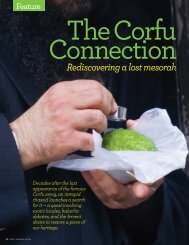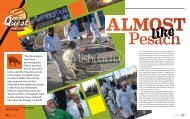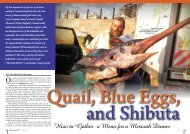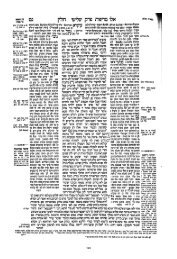Holy Shibuta: A fishy tale for Rosh Hashana - Halachic Adventures
Holy Shibuta: A fishy tale for Rosh Hashana - Halachic Adventures
Holy Shibuta: A fishy tale for Rosh Hashana - Halachic Adventures
You also want an ePaper? Increase the reach of your titles
YUMPU automatically turns print PDFs into web optimized ePapers that Google loves.
Turkey‘State dinner.’ Clockwise from lower left: Ari Zivotofsky, shibut expert Zafer Dogu, Asst. Prof. Erdinç Sahinöz, Governor Mehmet Özel, Ari Greenspan and two traveling companions.a cure <strong>for</strong> a disease called yarkona (jaundice?).On the other hand, according tothe Gemara, eating the shibuta duringthe spring month of Nisan could causeleprosy.One of the more interesting referenceshas to do with the unique taste of thecreature. The Talmud relates that <strong>for</strong>everything that God prohibited in thisworld, He also created a counterpartthat was permitted. For example, bloodis prohibited, but the liver, which containsan abundance of the vital fluid,was permitted. Even though milk andmeat may not be eaten together, theudder of a lactating cow is permissible.Now here’s the kicker. The pig, themost detestable of animals to theJewish people, is of course <strong>for</strong>bidden asfood. However, should one have a penchantto taste the <strong>for</strong>bidden swine, weare in<strong>for</strong>med that the flavor of pork isidentical to (part of) the shibuta.FOR THE LAST few centuries the identityof the talmudic shibuta has puzzledEuropean scholars and at least ahalf dozen possible species have beenproposed. But it is no longer a mystery<strong>for</strong> us. Having an interest in Jewishculinary traditions, several years ago Iasked an Iraqi-born Tel Aviv cab driverwhich kosher birds they used to eat inhis native land. When the nostalgia ofhis youth warmed hissoul, he smiled andsaid that by far thetastiest item in theircuisine was neitherfowl nor meat, but afish called the shabut.His response electrifiedme. Could his shabutin Arabic be the shibutaof the Talmud?As I later discovered,the great rabbinicleader of BaghdadiJewry from the early20th century, RabbiYosef Haim (known asthe Ben Ish Hai) hadno doubt. He listed thefive most commonkosher fish eaten inBaghdad and aftermentioning the shabut he says “that isthe shibuta of the Talmud.” So herewas the shibuta – it is a type of carpknown in Arabic as shabut and by thescientific name Barbus grypus, from thefamily Cyprinidae (carps and minnows).A lot of explainingand laughing went onin security offices thatday, and we gave anew meaning to flyingfish. They found it soamusing (and we werethe only passengers insight) that they evenpermitted us tophotograph the X rayof the shibutaThe Europeans were stymied becausethey were looking in Europe, while theshibuta of the Babylonian Talmud isobviously found inBabylonia, moderndayIraq.That taxi ride igniteda passion to beholdand maybe even tastethis talmudic delicacy.We turned to thelargest collection ofpreserved fish in thecountry, a true nationaltreasure located atHebrew University inJerusalem, but alas, itwas lacking shibuta.The next step wouldbe more difficult andwas our conundrum:The fish lives in theTigris and Euphratesrivers, which flowthrough Iraq, Iran andSyria and are not readily accessible toIsraelis. But with the help of severalparties outside of Israel, we managed toget our first few shibuta shipped fromits natural territory via a third country.The trouble was that they were preservedin <strong>for</strong>maldehyde, so we couldnot get a taste. A side benefit was thatwe were able to donate a Barbus grypusto the Hebrew University collection.Our desire <strong>for</strong> a frozen sample to eat on<strong>Rosh</strong> <strong>Hashana</strong> was not quelled. Travel toIraq, Iran and Syria may be difficult <strong>for</strong> us,but there are many US military and civilianpersonal in Iraq and US army chaplainLt.-Col. Jeremy Steinberg is amongthem. He had already served a tour ofduty in Afghanistan and was serving hissecond tour in Iraq. Having known him<strong>for</strong> many years and knowing that he isgood at detective work (he has a <strong>for</strong>thcomingbook on Hebrew etymology), I e-mailed him about my search and finallyconvinced him that I was really seriousabout wanting him to find a shabut.He agreed to look, though doubtedthat he would be successful. But succeedhe did. He approached an Iraqiwho was employed on the US Armybase and asked him to find out aboutthe possibility of getting a shabut <strong>for</strong>him. The base, being near theEuphrates and the shabut being popular,the Iraqi returned the next morningnot with in<strong>for</strong>mation but with a boxcontaining two big and two small specimens.Chaplain Steinberg promptly26 ROSH HASHANA 5768













![llVtlwnl 1p1l 1biip 3 K11lnM o1it1 [1] - Halachic Adventures](https://img.yumpu.com/35271577/1/190x253/llvtlwnl-1p1l-1biip-3-k11lnm-o1it1-1-halachic-adventures.jpg?quality=85)


